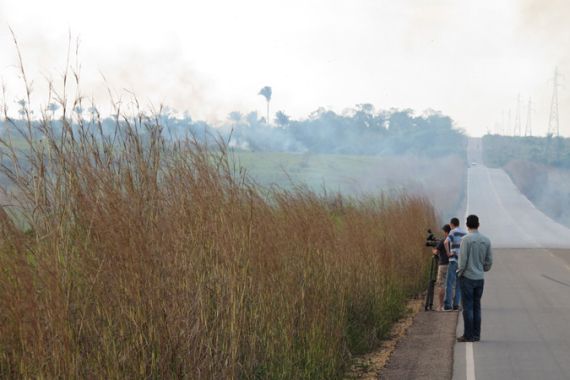
Telling the world their story
Brazil’s police and legal system may not be able to deliver justice but journalists can make sure their story is told.
 |
| Despite losing her sister and brother-in-law, Laisa Santos Sampaio, the sister of Maria do Espirito Santo, is finding the strength to carry on |
Tom Phillips, the director/producer of The Crying Forest, explains why the debate over the future of the Amazon – and, more broadly, of the planet – is not just about trees and carbon emissions, but about human lives.
I had never met Ze Claudio Ribeiro da Silva or Maria do Espirito Santo, despite having travelled frequently to their corner of the Amazon. But as soon as I heard about their murders on May 24 this year, I knew we had to make a film.
Keep reading
list of 4 itemsTurtles swimming to extinction in Malaysia as male hatchlings feel heat
Could shipping containers be the answer to Ghana’s housing crisis?
Thousands protest against over-tourism in Spain’s Canary Islands
Here were two people who had been viciously stripped of their lives for daring to stand up for the Amazon Rainforest. The police might not be able to catch the masked killers who had executed Ze Claudio and Maria on the side of a dirt road, Brazil’s legal system might not be able to secure the convictions of those behind the crime, but as journalists we could do something. We could tell the world their story. Ze Claudio and Maria would, I believe, have wanted that.
Six weeks after the killings we returned to the region of the Amazon where Ze Claudio and Maria had lived and died. We began spending time with their families and friends, visiting their abandoned home and their lands on the Praia Alta Piranheira settlement. From the outset, I felt a particular connection to Maria’s sister, Laisa, a remarkable, brave woman who had lived with them on the settlement.
Laisa, a primary school teacher, had suffered a crippling blow in losing her sister and brother-in-law, but nevertheless, with support from her kind-hearted husband, Ze Rondon, she was finding the strength to carry on.
During one of our first meetings Laisa recounted a conversation she had overheard between Ze Claudio and a friend, shortly before his execution in May. “Maybe my death will call much more attention than the reports I file,” Ze Claudio, who had spent nearly 15 years battling, often in vain, to alert authorities to the illegal destruction of the area around his home, had said.
It was a shocking, uncomfortable conclusion to draw. But after years of fighting tooth and nail to protect the Amazon forest around his home – and years of being almost completely ignored by the different spheres of government – it was perhaps the logical one.
“He was certain of this,” Laisa said. “He was convinced that this was the hard reality he was facing.”
The hard-reality that had crystallised in Ze Claudio’s mind was that if he was executed it would cause so much public and international outrage that authorities would be shamed into taking action. His death might mean the government would finally close down the illegal loggers; maybe it would even force them into providing protection to all those under threat for standing up to the Amazon’s violent environmental criminals.
Having spent time with the devastated relatives of Ze Claudio and Maria, it is impossible to agree with his conclusion. The couple’s passing has left a huge hole in the lives of their families; they were much loved and are hugely, hugely missed. But if Ze Claudio and Maria’s lives are to have any meaning, we must tell their stories in the hope that something will change, in the hope that something will be done to stop more lives being lost, in the hope, however small, that greater efforts will be taken to protect the forest they had loved so much.
Six months before being murdered Ze Claudio famously addressed a TEDx conference in the Brazilian Amazon. He predicted his own death; that prophecy came true. He also closed his speech with a poignant question. Pointing to a picture of a burned Brazil nut tree, Ze Claudio asked: “Is it possible that this is the future of the Amazon? Is it possible that this is the future of the planet?” He paused, before uttering the last line of his speech with his trademark eloquence: “I don’t think this is what we want.”
The Crying Forest is a tiny contribution to an intense and complex debate about the future of the Amazon and the future of the planet; a debate that involves not just trees and wildlife and carbon emissions but human lives. Our film is a small contribution, but I hope it is one that Ze Claudio and Maria would be proud of it.
Tom Phillips, based in Rio de Janeiro, is a correspondent for the Guardian newspaper and a television producer and director. Follow him on Twitter @tomphillipsrio.